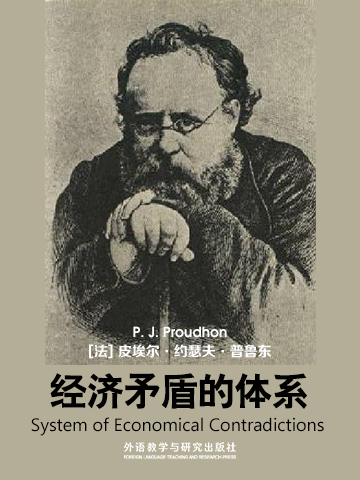以小资产阶级的角度,宣扬改良资本主义的社会矛盾。
本书是19世纪法国小资产阶级哲学家、经济学家和无政府主义者普鲁东(1809-1865)的一部重要著作,发表于1846年。这是在他的第一部理论著作《什么是所有权?》于1840年问世之后为解答他所提出的一系列问题转而研究政治经济学的结果。本书共分十四章,分别论述经济学、价值、分工、机器、竞争、垄断、警察和捐税、人和上帝在矛盾规律下的责任、贸易的平衡、信用、所有权、共有制、人口、概述和结论。 作者在本书中所暴露的种种错误,其中包括提出问题、论证方法和阐述的内容,都充分反映了作者的小资产阶级立场和观点。
The System of Economic Contradictions, or Philosophy of Poverty is a work by Pierre-Joseph Proudhon published in 1846 by Guillaumin et Cie, Paris. It inspired Karl Marx to write his rejoinder The Poverty of Philosophy. According to George Litcheim, the "doctrine that emerged went something like this: what people really needed were use values, whereas they were actually being offered exchanges values by the market. These represented thesis and antithesis; Proudhon (having on this point misunderstood Hegel) looked for a synthesis which he termed 'constituted value.' This amounted to saying that goods should be exchanged in proportion to the amount of labour embodied in them - an arrangement that would do away with market fluctuations and at the same time satisfy the requirement of justice." (Litcheim, A Short History of Socialism, 1975, p.76). At Chapter VII, Proudhon introduces the idea of consumption tax.
- INTRODUCTION.
- CHAPTER I. OF THE ECONOMIC SCIENCE.
- CHAPTER II. OF VALUE.
- CHAPTER III. ECONOMIC EVOLUTIONS. — FIRST PERIOD. — THE DIVISION OF LABOR.
- CHAPTER IV. SECOND PERIOD. — MACHINERY.
- CHAPTER V. THIRD PERIOD. — COMPETITION.
- CHAPTER VI. FOURTH PERIOD. — MONOPOLY
- CHAPTER VII. FIFTH PERIOD. — POLICE, OR TAXATION.
- CHAPTER VIII. OF THE RESPONSIBILITY OF MAN AND OF GOD, UNDER THE LAW OF CONTRADICTION, OR A SOLUTION OF THE PROBLEM OF PROVIDENCE.
- 书评 写书评
- 笔记
-
书评加载中...




















 京公网安备 11010802032529号
京公网安备 11010802032529号
笔记加载中...